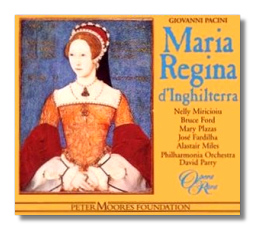
The Internet's Premier Classical Music Source
Related Links
- Latest Reviews
- More Reviews
-
By Composer
-
Collections
DVD & Blu-ray
Books
Concert Reviews
Articles/Interviews
Software
Audio
Search Amazon
Recommended Links
Site News
 CD Review
CD Review
Giovanni Pacini

Maria Regina d'Inghilterra
- Mary Tudor - Nelly Miracioiu, soprano
- Ricardo Fenimoore - Bruce Ford, tenor
- Ernesto Malcolm - José Fardilha, baritone
- Clotilde Talbot - Mary Plazas, soprano
- Gualtiero Churchill - Alastair Miles, bass
Godfrey Mitchell Choir
Philharmonia Orchestra/David Parry
Opera Rara ORC15 3CDs Recorded December 1995 & September 1996
Giovanni Pacini (1796-1867) was a contemporary of Rossini, Donizetti, and Bellini, but while their work has survived and flourished, his considerable output (more than 70 operas) has faded into oblivion. His work was conventional for its time, lying somewhere between the bel canto lyricism of Bellini and the dramatic power to come from Verdi, without the melodiousl inspiration of the former or the urgent vitality of the latter. His best-known and most successful work was Saffo (Naples, 1840), and Maria Regina d'Inghilterra was also greeted with acclaim at its premier in Palermo in 1843. However, after a decade or so it came to seem old-fashioned and disappeared from the stage until its revival by Opera Rara for the Camden Festival in 1983.
Part of the reason for its failure to survive lies in its libretto, written by the lawyer and poet Leopoldo Tarantini. In some ways he did a good job, providing plenty of opportunities for solos, duets, and quartets and devising effective end-of-act climaxes, but he was unable to cope with the melodramatic complexities of plot and counter-plot in the Victor Hugo play on which the opera is based. And the sequence of events often makes little sense. Mary Tudor is infatuated with the adventurer Ricardo Fenimoore, whom she has ennobled as Lord Talbot; but he is unfaithful, having seduced the foundling Clotilde, who has been raised by and is now betrothed to the adoring Ernesto Malcolm, a commoner. Gualtieri Churchill, the Lord Chancellor, who wants to protect the queen by bringing Ricardo down, reveals his duplicity to Mary and also the fact that he has concealed his knowledge that Clotilde is heir to the Talbot name. The ending is a real muddle: Mary condemns him to death but repents and orders Clotilde to see to his release; she frees Ernesto instead but he is brought back to the scaffold, whereupon Gualtieri sees to it that it is Ricardo who is executed, to the dismay of Mary and the delight of Ernesto and Clotilde.
Pacini was not one to subordinate a good tune to the requirements of plot and characterization; many of the arias seem to have little relationship to what is happening on stage. His most imaginative work is in the recitatives (all accompanied), which are well-written and expressive. The pace of Act I is good, but it slackens considerably in Act II and only picks up again in the touching final act arias for the principal characters. None of the arias is particularly memorable, but they are consistently tuneful, and in this recording they are well-sung by a competent cast. The dark soprano of Nelly Miricioiu is nicely matched in the duets with the lighter voice of Mary Plazas; Bruce Ford's light and lyrical tenor and José Fardilha's resonant baritone are heard to good advantage in the roles of Ricardo and Ernesto. The orchestra isn't great – thin strings and blaring brass – and the sound balance is not good, with the singers seeming to come from well behind the players. The set is nicely packaged, with lengthy and interesting notes. What we have, then, is no neglected masterpiece, but it is an interesting example of mid-nineteenth century Italian opera, given a workmanlike production, that is well worth hearing as long as you don't expect too much from it.
Copyright © 1998, Alexander J. Morin



















